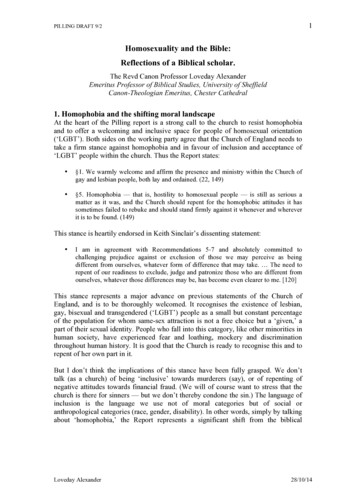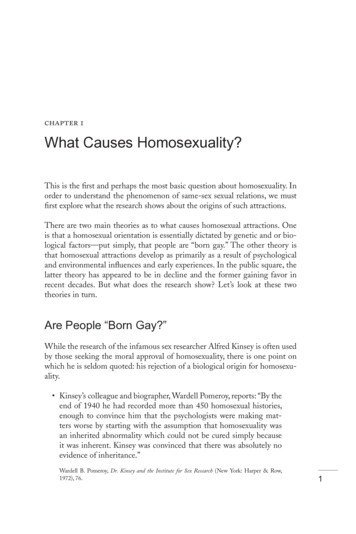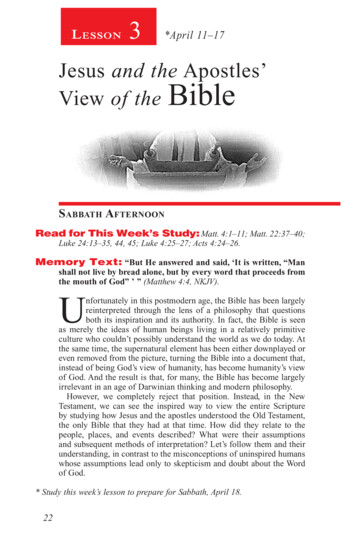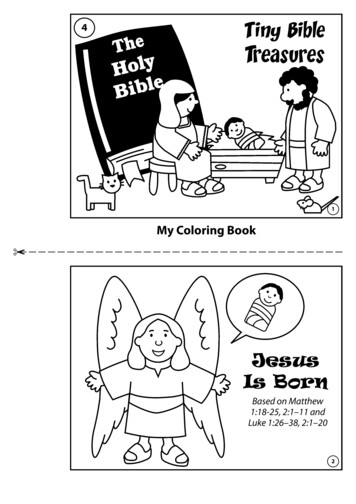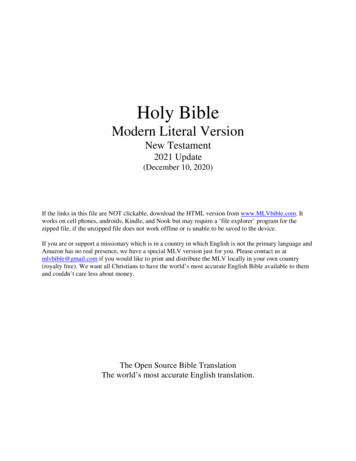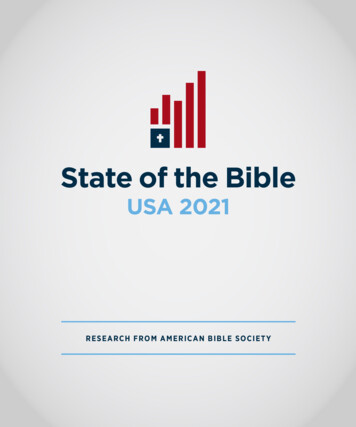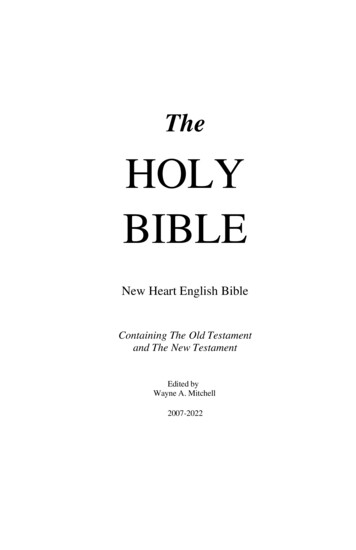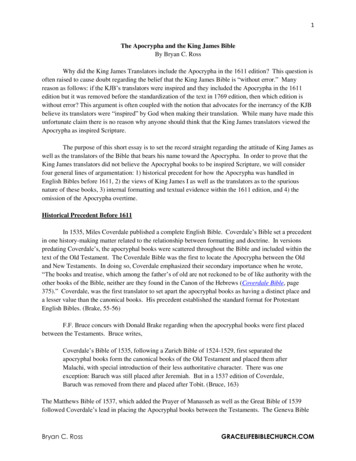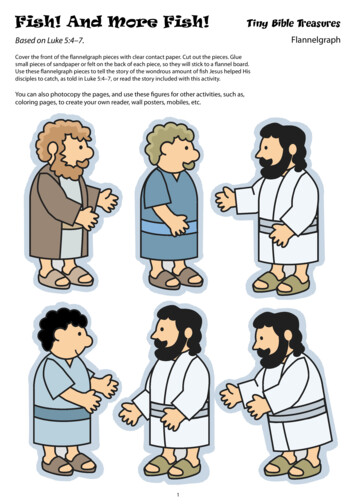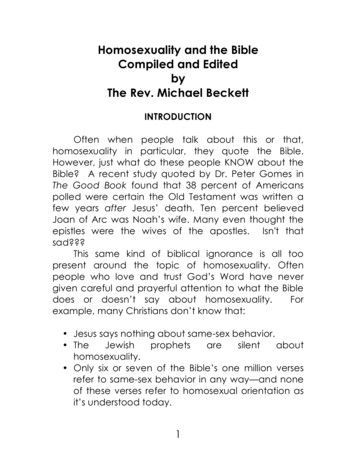
Transcription
Homosexuality and the BibleCompiled and EditedbyThe Rev. Michael BeckettINTRODUCTIONOften when people talk about this or that,homosexuality in particular, they quote the Bible.However, just what do these people KNOW about theBible? A recent study quoted by Dr. Peter Gomes inThe Good Book found that 38 percent of Americanspolled were certain the Old Testament was written afew years after Jesus’ death. Ten percent believedJoan of Arc was Noah’s wife. Many even thought theepistles were the wives of the apostles. Isn't thatsad?This same kind of biblical ignorance is all toopresent around the topic of homosexuality. Oftenpeople who love and trust God’s Word have nevergiven careful and prayerful attention to what the Bibledoes or doesn’t say about homosexuality.Forexample, many Christians don’t know that: Jesus says nothing about same-sex behavior. TheJewishprophetsaresilentabouthomosexuality. Only six or seven of the Bible’s one million versesrefer to same-sex behavior in any way—and noneof these verses refer to homosexual orientation asit’s understood today.1
It is my hope that this thesis will aid all of our GLBTfamily in their quest for truth as to what the Bible saysabout homosexuality.THE BIBLE ITSELFMost people who are certain they know what theBible says about homosexuality don’t know where theverses that reference same-sex behavior can be found.They haven’t read them, let alone studied themcarefully. They don’t know the original meaning of thewords in Hebrew or Greek. Moreover, they haven’ttried to understand the historical context in which thosewords were written. Yet the assumption that the Biblecondemns homosexuality is passed down fromgeneration to generation with very little personal studyor research. The consequences of this misinformationare disastrous, not only for God’s gay and lesbianchildren, but for the entire church.One of the reasons for this misinformation is causedby the many variations of the Bible itself. There aredifferent interpretations of languages, different versionsof those interpretations, and paraphrases of theinterpretations. In some cases, the publishers of theBibles in questions simply guess as to the meanings ofsome of the ancient words used in the Bible.To discuss this further, let's look at translations versusparaphrases:2
TranslationsA good translation is taken from the Koine Greekwhich is the most common written language usedduring the time the New Testament was written.Interlinear translations are at one end of thespectrum. These translations contain the originallanguage text along with a word-for-word renderinginto the target language. However, a strictly word-forword translation is often not the best possible way tocapture the meaning of each Bible verse. Why not?There are a number of reasons. Here are two:1. No two languages are exactly alike in grammar,vocabulary, and sentence structure. Professor ofHebrew S. R. Driver says that languages “differ not onlyin grammar and roots, but also . . . in the manner inwhich ideas are built up into a sentence.” People equently,” continues Professor Driver, “the formstaken by the sentence in different languages are notthe same.”Since no language exactly mirrors the vocabularyand grammar of Biblical Hebrew and Greek, a wordfor-word translation of the Bible would be unclear ormight even convey the wrong meaning. Consider thefollowing examples.In his letter to the Ephesians, the apostle Paul usedan expression that is literally translated “in the (dice)cube of the men.” (Ephesians 4:14, The KingdomInterlinear Translation of the Greek Scriptures) Thisexpression refers to the practice of cheating otherswhen using dice. In most languages, however, a literal3
rendering of this allusion makes little sense. Translatingthis expression as “the trickery of men” is a clearer wayto convey the meaning.When writing to the Romans, Paul used a Greekexpression that literally means “to the spirit boiling.”(Romans 12:11, Kingdom Interlinear) Does this wordingmake sense in your language? The expression actuallymeans to be “aglow with the spirit.”During one of His most famous speeches, Jesusused an expression that is often translated: “Blessed arethe poor in spirit.” (Matthew 5:3) But a literal renderingof this expression is obscure in many languages. Insome cases, a strictly literal translation even implies that“the poor in spirit” are mentally unbalanced or lackingin vitality and determination. However, Jesus was hereteaching people that their happiness depended, noton satisfying their physical needs, but on recognizingtheir need for God’s guidance. (Luke 6:20) So suchrenderings as “those conscious of their spiritual need” or“those who know their need for God” convey moreaccurately the meaning of this expression.—Matthew5:3; The New Testament in Modern English.2. The meaning of a word or an expression maychange depending on the context in which it is used.For instance, the Hebrew expression that normally refersto the human hand may have a wide variety ofmeanings. Depending on the context, this word edness,” or “power.” (2 Samuel 8:3; 1 Kings10:13; Proverbs 18:21) In fact, this particular word istranslated in over 40 different ways in the English editionof the New World Translation of the Holy Scriptures.4
Because the context can affect the way a word istranslated, the New World Translation uses nearly 16,000English expressions to translate some 5,500 BiblicalGreek terms, and it uses over 27,000 English expressionsto translate about 8,500 Hebrew terms. Why this varietyin the way words are translated? The translationcommittee judged that to render the best sense ofthese words according to the context was moreimportant than to produce a strictly literal translation.Even so, the New World Translation is as consistent aspossible in rendering Hebrew and Greek words into thetarget language.Clearly, Bible translation involves more than simplyrendering an original-language word the same wayeach time it occurs. Translators must use goodjudgment in order to select words that present theideas of the original-language text accurately andunderstandably. In addition, they need to assemble thewords and sentences in their translation in a way thatconforms to the rules of grammar of the targetlanguageParaphrasesTo paraphrase:1. a restatement of a text or passage giving themeaning in another form, as for clearness;rewording.2. the act or process of restating or rewording.A paraphrase is taking from a translation, usuallyThe King James Bible, and putting it into the local5
vernacular for better understanding. A paraphrase is aretelling of something in your own words. A paraphraseof the Bible is different from a translation in that atranslation attempts (to varying degrees) tocommunicate as “word-for-word” or as “thought-forthought” as possible. A paraphrase takes the meaningof a verse or passage of Scripture and attempts toexpress the meaning in “plain language” – essentiallythe words the author of the paraphrase would use tosay the same thing. For easy reading, a paraphrasemay be more desirable than a translation, and manypeople use paraphrases as their “reading Bible,”preferring to read straight through as with a novel. Thiscan be particularly helpful in long narrative passagessuch as found in Genesis, 1 and 2 Kings, and 1 and 2Chronicles.While easier to read, especially for new Christiansand younger people, a paraphrase will outdate itself ina few years after it was written. For example in the late60's, the most popular Bible was "The Good News forModern Man". However, a person reading it todaywould not totally understand it because some of thewords used then would be non-understandable today.Another popular paraphrase, The New LivingTranslation, while very readable, loses in its veryreadability. For example:Romans 8:1 KJV says "There is therefore now nocondemnation to them which are in Christ Jesus, whowalk not after the flesh, but after the Spirit"Romans 8:1 NLT says "So now there is nocondemnation for those who belong in Christ Jesus."6
The NLT does not have the rest of that passage!The chapter of Romans 8 speaks specifically aboutwalking in the flesh vs. walking in the spirit.Paraphrased Bibles often take liberties with the textas presented in the original languages. How so? Thepublishers who produce these Bibles, often called "freetranslations," either insert their opinion of what theoriginal text could mean or omit some of theinformation contained in the original text. Paraphrasetranslations may be appealing because they are easyto read, however, their very freeness at times obscuresor changes the meaning of the original text.Consider the way that one paraphrase Bibletranslates Jesus’ famous model prayer: “Our Father inheaven, reveal who you are.” (Matthew 6:9, TheMessage: The Bible in Contemporary Language) Amore accurate translation of Jesus’ words renders thispassage: “Our Father in the heavens, let your name besanctified.” Note, too, the way that John 17:26 isrendered in some Bibles. According to one freetranslation, on the night of his arrest, Jesus said to hisFather in prayer: “I made you known to them.” (Today’sEnglish Version) However, a more faithful rendering ofJesus’ prayer reads: “I have made your name known tothem.” Can you see how some translators actually hidethe fact that God has a name that should be used andhonored?And then, there is the King James Version of theBible. It probably is the most beautiful, elegant, literaryEnglish translation that will ever be produced. In fact, itcontributed a great deal to the formation of the Englishlanguage as we know it. Modern translations usually7
lack the poetry of the King James because modernbiblical scholars are more scientists than artists.Nevertheless, there are two major problems withthe King James Version. First of all, when it wastranslated in 1611, there were relatively few Hebrewand Greek manuscripts available and they tended tobe recent and less accurate. In the 400 years sincethen, literally thousands more manuscripts have beendiscovered, ranging from small portions to completecopies of the Old or New Testaments. Many of theseare very early and more accurate.Secondly, the English in the King James Version isnot at all the same language spoken today. Both thevocabulary and grammar have changed considerably.As a result, a reader often must retranslate the KingJames into modern English in his or her mind. For manypeople, especially children, reading the King JamesVersion is like reading a foreign language.So what DOES the Bible say?Christian United Churches believe that the Bible isthe divinely inspired Word of God, revealing God's loveto every person through the law and the prophets, andfinally, completely and ultimately in the being of JesusChrist. However, the Bible is not a history book, apsychology text, or a scientific journal. The Bible is thedescription God gave us about who He is, and Hisdesires and plans for humanity. The most significantcomponent of this revelation is the story of ourseparation from God by sin and God’s provision forrestoration of fellowship through the sacrifice of His Son,Jesus Christ, on the cross. Our need for redemption8
does not change. Neither does God’s desire toreconcile us to Himself.Hebrews 4:12 says, “For the word of God is livingand active. Sharper than any double-edged sword, itpenetrates even to dividing soul and spirit, joints andmarrow; it judges the thoughts and attitudes of theheart.” While the Bible was completed approximately1900 years ago, its accuracy and relevance for todayremain unchanged. The Bible is the sole objectivesource of all the revelation God has given us aboutHimself and His plan for humanity.The Bible contains a great deal of informationabout the natural world that has been confirmed byscientific observations and research. Some of thesepassages include Leviticus 17:11; Ecclesiastes 1:6-7; Job36:27-29; Psalm 102:25-27 and Colossians 1:16-17. (Lookthese passages up!) As the Bible’s story of God’sredemptive plan for humanity unfolds, many differentcharacters are vividly described. In those descriptions,the Bible provides a great deal of information abouthuman behavior and tendencies. Our own day-to-dayexperience shows us that this information is moreaccurate and descriptive of the human condition thanany psychology textbook. Many historical factsrecorded in the Bible have been confirmed by extrabiblical sources. Historical research often shows a greatdeal of agreement between biblical accounts andextra-biblical accounts of the same on—is universally and perpetually applicableto humanity. God’s Word will never be outdated,superseded, or improved upon. Cultures change, lawschange, generations come and go, but the Word of9
God is as relevant today as it was when it was firstwritten. Not all of Scripture necessarily applies explicitlyto us today, but all Scriptures contain truths andexamples that we can, and should, apply to our livestoday.So What about Homosexuality?Over the centuries the Holy Spirit has taught us thatcertain Bible verses should not be understood as God’slaw for all time periods. Some verses are specific to theculture and time they were written, and are no longerviewed as appropriate, wise, or just.Often, the Holy Spirit uses science to teach us whythose ancient words no longer apply to our moderntimes. During the last three decades, for example,organizations representing 1.5 million U.S. healthprofessionals (doctors, psychiatrists, psychologists,counselors, and educators) have stated definitivelythat homosexual orientation is as natural asheterosexual orientation, that sexual orientation isdetermined by a combination of yet unknown pre- andpost-natal influences, and that it is dangerous andinappropriate to tell a homosexual that he or she couldor should attempt
Jesus says nothing about same-sex behavior. The Jewish prophets are silent about homosexuality. Only six or seven of the Bible’s one million verses refer to same-sex behavior in any way—and none of these verses refer to homosexual orientation as it’s understood today. 2 It is my hope that this thesis will aid all of our GLBT family in their quest for truth as to what the Bibl
